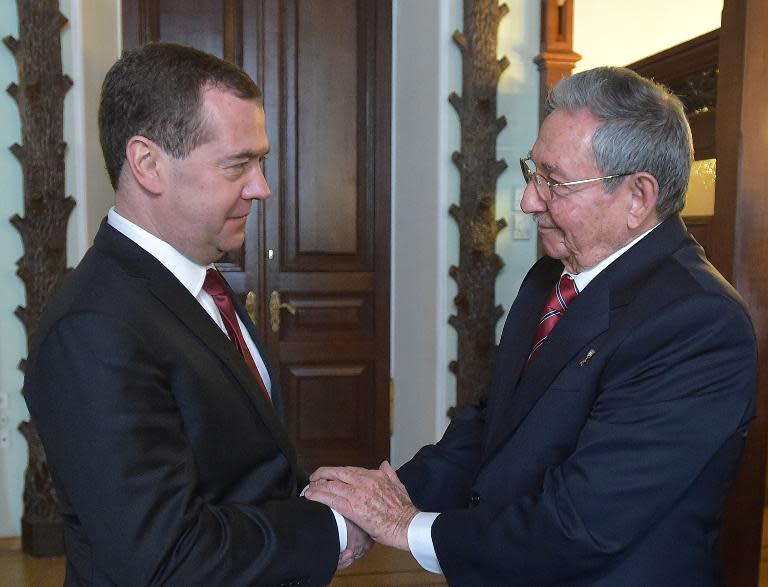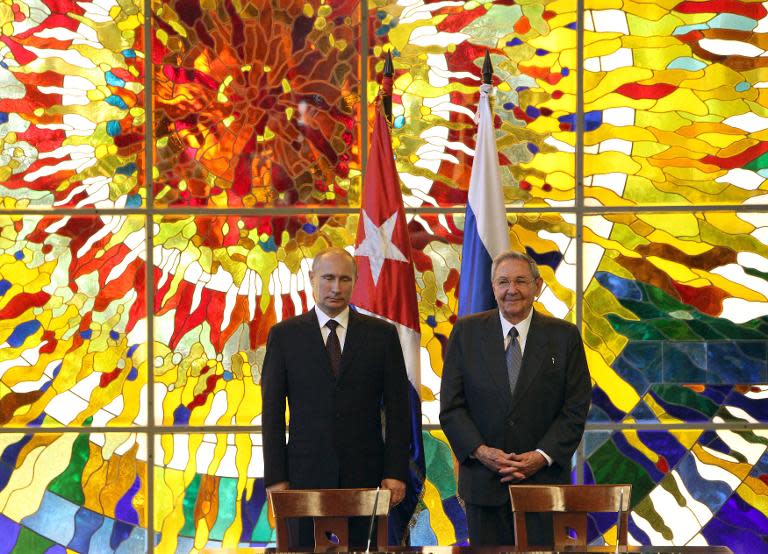Cuba's Castro starts Russian visit ahead of WWII parade
Cuban President Raul Castro began a series of meetings with Russian leaders Wednesday during a symbolic visit to Havana's Cold War ally for a World War II victory parade at a time of thawing ties with Washington. Castro's presence in Moscow makes him one of a dwindling list of dignitaries and foreign leaders set to attend the grandiose Red Square parade on May 9 to mark 70 years since the WWII victory over Nazi Germany in 1945. Western diplomats have made plans to visit Russia this week but few European leaders are staying for the parade and even Russia's closest allies from the former Soviet Union, including Belarus, have opted to stay away. The visit is Castro's third to Havana's Cold War-era ally Moscow as head of state. He is the first foreign leader to arrive ahead of the celebrations that will showcase Russia's military might. Castro met with Russian Prime Minister Dmitry Medvedev Wednesday after jetting into Moscow late Tuesday. He is to meet President Vladimir Putin on Thursday for talks and attend several Kremlin events, including a dinner Friday, before attending the parade. He and Putin last met in July 2014, when the Russian leader went to Cuba on his Latin American tour. This will be their first encounter since the historic rapprochement between the island's leftist leaders and the United States. In March, Russia's Foreign Minister Sergei Lavrov went to Havana to reinforce Russia's demands for an end to the US blockade. US President Barack Obama has moved to strike Cuba from the US terror list, which removes some restrictions and grants Cuba access to the US banking system, but many other sanctions remain in place. - Competition to help Cuba - Cuba's thawing of relations with Washington comes as Moscow seeks allies in Latin America and other parts of the world. Its relations with the West, particularly the United States, are at a post-Cold War low over the Ukraine crisis. The United States authorised on Tuesday commercial ferry services to Cuba for the first time in more than a half-century, another major step in improving relations between the two countries. Isolated Moscow wrote off last year 90 percent of Cuba's Soviet-era debt of more than $35 billion (about 31 billion euros) and pledged to invest in the Cuban economy. The thawing of relations between Cuba and the United States is forcing Moscow to compete with Washington to help the economically poor nation, said Viktor Kremenyuk, deputy director of the Institute of United States and Canada at the Russian Academy of Sciences. "America changed its policy and will help Cuba, and that pushes Russia not to fall behind. It will be hard to compete for Russia but there is such an incentive. From the point of view of Cuba that is normal and good." Castro was likely to play to these sentiments when dealing with Russia, in order to "get more from both countries," Kremenyuk said. "He wants to make his role more significant with this visit and hopes to get additional help from Russia," he added. The Kremlin on Wednesday listed several infrastructure projects in Cuba as potentially interesting for Moscow, including modernisation of its power and steel plants, building a new airport and developing offshore oil fields. Russia and Cuba were allies during the Soviet era and Raul Castro visited the country dozens of times in his capacity as defence minister. During one in 1962 he agreed to the details of placing Soviet nuclear missiles on the island, which sparked the Cuban missile crisis.

 Yahoo Finance
Yahoo Finance 


